
Check out our latest video by clicking here!
Featured in this video are first-hand accounts from the following former WARA Fellows:
Don’t forget to subscribe to our youtube channel for more to come.. 🙂
The West African Research Center (WARC), on Tuesday, June 6, 2017, convened and hosted a press conference to advertise a major event scheduled to kick off on Friday, June 9 to celebrate the achievements of the Father of African Cinema, Sembene Ousmane.
The press conference featured Professor Samba Gadjigo (Mount Holyoke College, Mass. USA) author of several books and articles on Sembene and of the celebrated documentary titled Sembene!, sitting next to well-known Senegalese filmmakers Ben Diogaye Beye and Mansour Sora Wade.
Reporters were informed that for three days running (Friday, Saturday, Sunday, June 9, 10, 11) the documentary Sembene! will be shown in up to 35 African countries. In Senegal, the same documentary will be shown along with well-known films by Sembene such as Gelwaar, Emitai, Mandat-Bi, La Noire de….in various locations including the capital Dakar, Pikine, Guediawaye, Saint Louis, Thies, Tambacounda, Toubacouta, Sokone etc…..
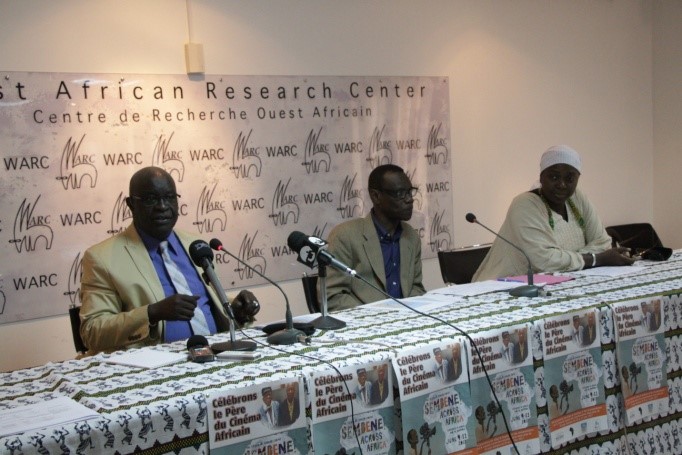
Left to right: Prof Sene, WARC Director; Prof Samba Gadjigo, Mount Holyoke College & Galle Ceddo; Mme Fatou Kande Senghor, activist and filmmaker
Events in Senegal are jointly organized by the West African Research Center (WARC), Galle Ceddo (established in the USA), Cacsen and Dararay Sembene(Senegal)

Applications for the Fall 2017 competition are now open! Click here to apply! The submission deadline is September 15, 2017.
Funding for the WARC Travel Grant Program is provided by the Bureau of Educational and Cultural Affairs of the US Department of State through a grant from the Council of American Overseas Research Centers.
The WARC Travel Grant promotes intra-African cooperation and exchange among researchers and institutions by providing support to African scholars and graduate students for research visits to other institutions on the continent. This competition is open only to West African nationals, with preference given to those affiliated with West African colleges, universities, or research institutions.
World-renowned chef Pierre Thiam joined the West African Research Center and the Dakar Women’s Group on Wednesday, June 7th, to discuss Senegalese and West African cuisine, linking it to the importance of local produce, cereals, vegetables, and fruit.
Chef Thiam, who is known around the world as the ambassador of West African cuisine, headed up the 2017 Tastes of West Africa Culinary Institute that took place in Senegal in February. His restaurant, Nok at Alara, in Lagos continues to receive rave reviews.
In Dakar on Wednesday, Chef Thiam presented as Q&A with faculty from the City College of New York and Barbarao Syrrakos of the Dakar Women’s Group. During this session, Chef Thiam shed light on the background of his leaving Senegal in the mid-80s to go and try his luck in US higher education. While working as a waiter, his fascination for cooking was born and from that point forward followed his calling to become a chef.
Chef Thiam also discussed Senegalese cuisine and the need to preserve traditional recipes, especially since they are particularly healthy. He insisted on the re-introduction and importance of local produce for both their nutritional quality and richness as an effort to keep the people healthy.
Chef Thiam is famous for his appearance on Anthony Bourdain’s Parts Unknown, CNN’s Inside Africa, and Food Network’s Iron Chef. His two books showcasing West African-influenced cuisine are: Yolele! Recipes from the Heart of Senegal and more recently SENEGAL: Modern Senegalese Recipes from the Source to the Bowl.
Every year (for the past three years), during the month of Ramadan, the celebrated Senegalese music star Youssou Ndour and his media group GFM hold, for over ten days, a festival of sacred music in Senegal with the participation of music groups hailing from Senegal, Morocco, Mauritania and several other Muslim countries.
For the 2017 edition, the initiator had earlier expressed the desire to give the event a more established academic component. In this respect, University Cheikh Anta Diop, the University of North Carolina Chapel Hill and the West African Research Center (WARC) were approached. That is why this year’s Salam Festival kicked off with a three-day symposium on Sufi Zikr performance.
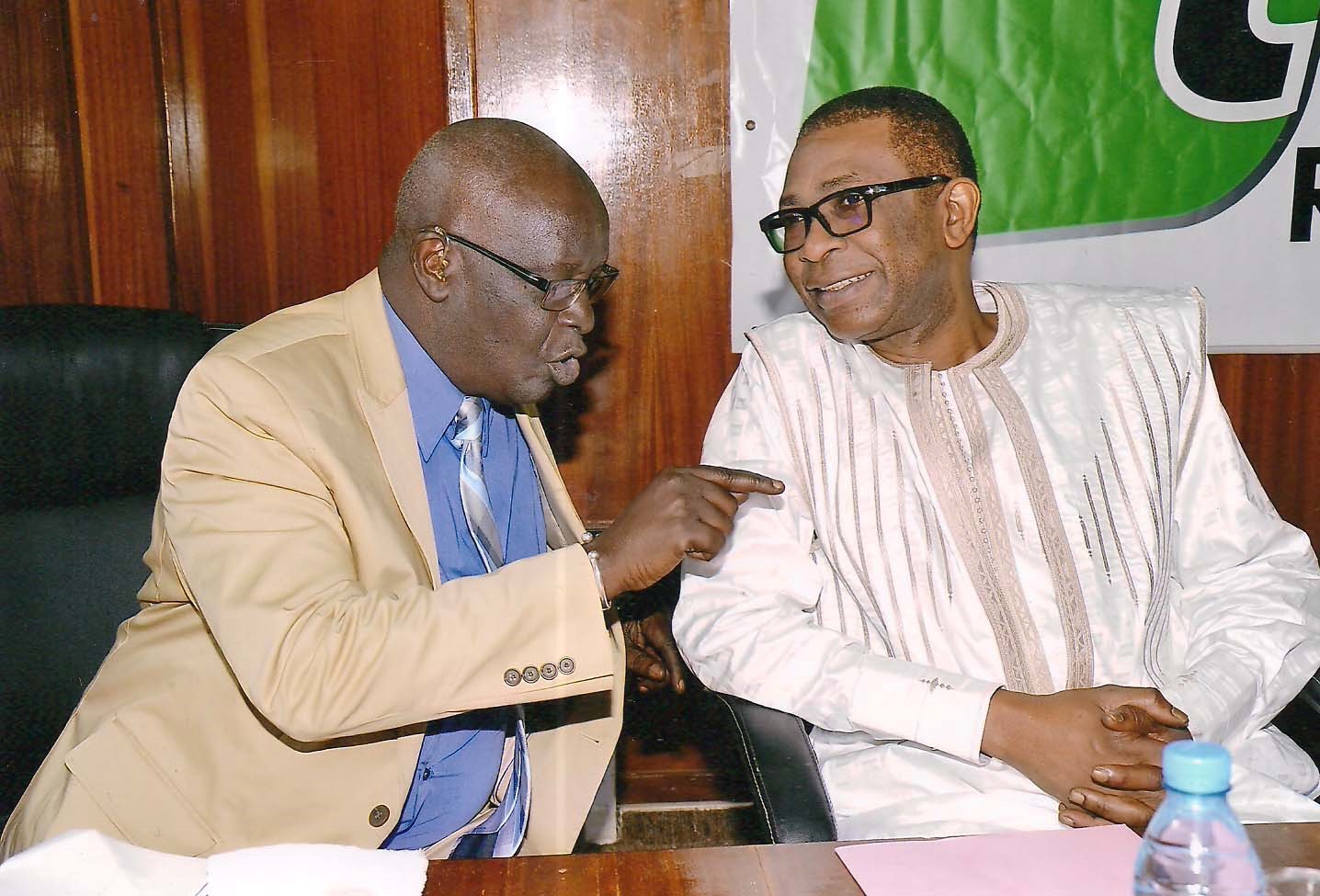
WARC Director, Professor Ousmane Sene, and world-renowed Senegalese singer, Youssou Ndour, having a captivating discussion at the Salam Festival symposium
Since Monday, June 5 in the main amphitheater of University Cheikh Anta Diop campus, 15 participants from Turkey and 12 from the United States (mainly from UNC Chapel Hill) have been exchanging ideas on various themes such as Sufi Figures, Forces and Localities, Sufi Geneses and Genealogies, Sufi Voices etc….. Meanwhile and for over ten days, every evening the Senegalese capital Grand Theatre, Daniel Sorano National Theatre in Dakar and many other meeting squares in the capital and other parts of the country will be enlivened with the rapturous chants and songs from Senegalese, Turkish, Moroccan, Mauritanian religious singers.
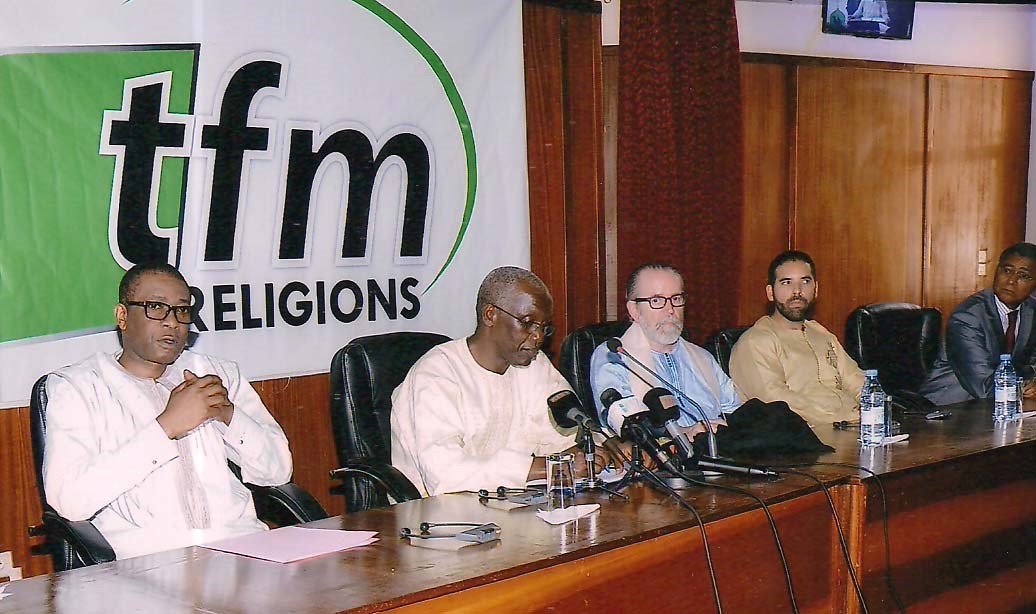
Left to right: Mr Youssou Ndour; Prof Ibrahima Thioub, Rector, UCAD; University of North Carolina delegates: Prof Carl Earnst and Michael A. Figueroa; Moroccan Ambassador to Senegal
At the West African Research Center in Dakar, Senegal, WARA Post-Doc Grantee Emily Riley, of Michigan State University, hosted a discussion on June 1, 2017 to coincide with her research project, “Teranga and Hospitality as the Foundation of the Senegalese Nation and of Political and Religious Practices in Dakar.” This event was held as part of the WARC Researchers’ Mini-Seminar series.
Dr. Riley has been visiting Dakar as a WARC affiliate over the past four years to research a subject that is a very important feature of Senegalese social life and values: Teranga.
The Wolof word “teranga” is a noun derived from the verb “teral” meaning to treat a guest decently – royally most of the time – and the Senegalese people actually pride themselves with the consummate art of making visitors feel completely at home.
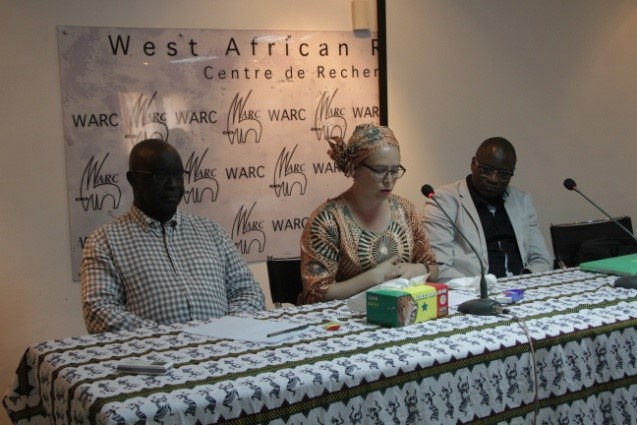
Left to right: Pr Ousmane Sène, WARC Director, Emily Riley, MSU & Mamarame Seck, IFAN
The treat however has a cost, in some case a very high one at that, which may cause Senegalese families to overspend, incur debts, and fall into a state of economic hardship. This means that the practice of teranga could potentially be economically counter-productive as it depletes savings which, otherwise, could be invested. Instead, it goes toward the contentment of neighbors, relatives, friends, and sycophants.
Dr. Riley, who has become extensively familiar with Senegalese culture, expertly introduced the subject at this mini-seminar and engaged the audience in a lively Q&A session that brought up some very deep insights.
This event brought in some 30 participants, including visiting researchers and scholars, local academics, grad students, and Dr. Riley’s many Senegalese friends.
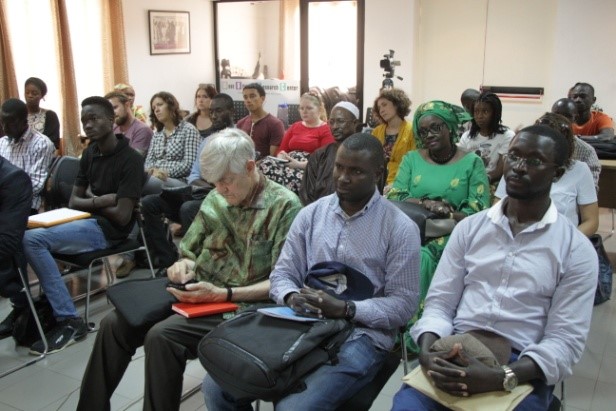
Seminar participants ready to talk “Teranga”